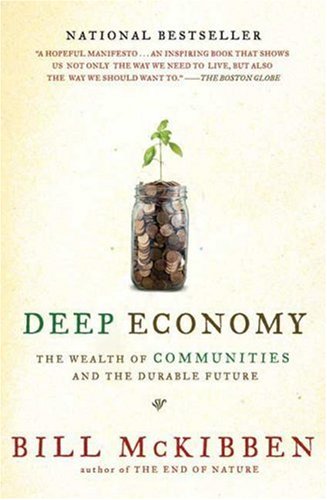
Just started reading a book called Deep Economy by Bill McKibben. While I intend to write a full review once I finish it, it brings up an intriguing question:
Should our economy (and therefore society) strive for growth as its central economic policy or should it focus on locally driven prosperity?
I don't necessarily believe the two are directly tied to one another - as our economy grows, our people prosper. It seems we have surpassed some type of tipping point, where "more" does not mean "better". More so, "more" no longer means increased happiness like it once did.
An example - the U.S. economy grew by 3.3% (as a whole) in the last quarter, even as people lost their homes, unemployment grew, income decreased, fuel prices increased, and food prices increased. The economy has also become the central issue in our next round of elections, even with growth, tax breaks, and rebate checks.
Has the economic theory of Adam Smith become less relevant as we move into another era in history?
Saturday, August 30, 2008
Deep Economy
By
Matthew
Labels: Bill McKibben, Deep Economy, economy
Subscribe to:
Post Comments (Atom)

5 comments:
Has the economic theory of Adam Smith become less relevant as we move into another era in history?
I don't think so. Remember, economics is about what people want. People can want material things or lifestyle things. The guy who pays a ton of money for a house close to his work isn't paying for the house, he's paying for the convenience. Americans have already decided that they're willing to sacrifice some material wealth for the benefits of untrammeled wilderness. It's just a matter of what people want -- and it's still very much within the realm of economics.
Prog,
I'd love to see a review when you've finished the book.
Smith can be adapted to make him more relevant to a sustainable economy. His ideas worked for the natural and social environments in which he operated. Thisngs have changed.
Generally, we need to pay more heed to the inherent linkages between economy and ecology. The artificial distinction we've made between them is only a feasible model so long as the human population is small as compared to the available resources and waste sinks.
Another issue that seems to get lost in policy discussions is the one that's the most relevant to daily life: the local community. People need to pay far more attention than most currently do to local business, development, planning, and their local governments. And, since I haven't brought it up in nearly fifteen minutes, we need to increasingly localize power generation.
That said, longer range commerce (that's longer range than the local community) remains and will remain important. Few if any communities make everything that they value.
I do not believe that the economy could have grown by 3.3 if all this adversity took place. It fails the common sense test. Where was the increase shown? Everything fell. With the increase in oil prices and the added expense suppliers had to pay; practically everyone had to raise their prices to cover this increase. The auto industry, homes, and other big ticketed items that normally carry the economy are in the toilet so I cannot see how the economy could have grown. However, the more you scare the populace into believing that “the sky is falling” the more it will inevitably take place. So some creative economists come up with a way to not only balance the books but show a profit. I haint had too much of that book learnin, so maybe you can splain it to me.
All,
A related follow-up question: Should corporations, like people, die at some point?
Interesting question, ERD. Of course, most corporations do die a natural death, but I'm assuming that you're wondering if we should perform euthanasia on corporations that reach a certain age. I don't think so. I can't think of a single reason why a hale and hearty centenarian corporation should be sent to the glue factory. If it's still financially healthy, let it outlive every human on the planet!
Post a Comment